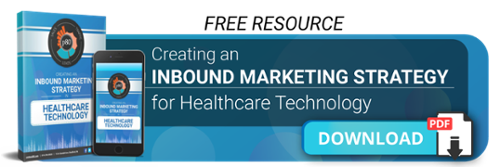Inbound Marketing Blog
for Manufacturers and Healthcare Companies
Healthcare Writing Tips for your Company Blog
 Writing a blog post for the healthcare industry can seem daunting -- especially if you’re in B2B healthcare marketing -- but it’s fundamental to success in modern lead generation.
Writing a blog post for the healthcare industry can seem daunting -- especially if you’re in B2B healthcare marketing -- but it’s fundamental to success in modern lead generation.
Healthcare marketing content is an important factor of identifying yourself in an industry where buyers are busy and the digital space is crowded. Healthcare blog posts help to build credibility and make it easier for you to be found online.
Healthcare blogging does not have to be boring, cut-and-dry, and plain. It can be creative and clever, while remaining informational and accurate. Creating educational content that readers enjoy reading can help construct relationships with future and current customers. We’ll show you how to do that in the five easy-to-follow healthcare writing tips.
5 Healthcare Writing Tips
How do you create content for clients that is useful and relevant?
Here are five ideas to take into consideration:
- Remain accurate and consistent
- Attract the appropriate audience
- Keyword research
- Efficiently and effectively organize the blog post
- Moving customers through the buyer’s journey
1. Remain Accurate and Consistent
To attract new customers, your information needs to be accurate. This sounds hyper-obvious, but it’s an absolute necessity when writing a healthcare blog.
As soon as you publish a false claim or inaccurate information, it will be hard to regain your audience’s trust. As the person writing the blog, it’s your responsibility to ensure the post is accurate and contains up-to-date information.
Giving false information to customers could have serious consequences. For example, with the COVID-19 pandemic, providing a list of false symptoms or incorrect testing scenarios could cause people to miss their actual symptoms and not get tested.
2. Attract the appropriate audience.
Targeting and engaging the right people. Potential patients could be attracted and current patients retained. If you were to target the incorrect audience, the blog would be pointless and ineffective.
3. Keyword Research
When writing a blog post, it is important to do keyword research in order to rank well in a Google search. Relating back to the previous tip, in order to attract the appropriate audience, you need to make sure you are including valuable and searchable information. It is important to include relevant keywords in your title and throughout the body in order to rank well.
4. Efficiently and effectively organize the blog post.
Organizing the information into a logical post will increase readability for readers, while better the chances of readers staying engaged. You should also frontload the article with your most impactful content so readers don’t leave while you waste time getting to the point.
It’s also important to write in a way that your healthcare buyer persona will understand. Keeping jargon and uncommon terms to a minimum will help readers stay on track, engaged, and learning.
5. Moving customers through the buyer journey.
At the end of your blog post, it is important to include a call to action (CTAs). CTAs can include graphics, buttons, forms, pop-ups, links, etc. By including a CTA, you are urging readers to progress through the buyer’s journey without being too “sales-y” or pushy. It is a subtle way to engage interested readers.
Putting These Healthcare Writing Tips to Work
Your healthcare blogging is on the front lines of your company’s digital marketing efforts. Your readers should be your #1 priority -- not your sales pitch. If readers aren’t satisfied with the blog post, or if they aren’t receiving useful, accurate, and important information, there’s a smaller chance of them reading future posts. That means fewer high-quality leads for your marketing funnel.
For more healthcare writing tips -- and strategic advice for all areas of medical content marketing -- check out the free e-book below.
Our Blogs, Direct to Your Inbox!
How to Audit your Online Marketing
If you are executing digital marketing, congratulations! You are most likely already one step ahead of your competition, and making strides to meaningfully connect with prospects online. But, how do you know if you’re seeing continual success year over year, and improving your metrics?
Without the tools in place to analyze and benchmark your efforts, it is impossible to scale your online marketing and ensure continuous success.



